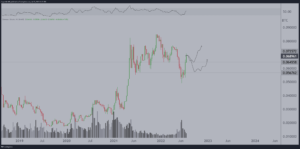كان بيع البيتكوين وعودتها مدفوعين بالتنظيم
Unless you’ve been under a rock over the past couple of weeks, you know that إلى البيتكوين (BTC) got hammered recently and then made a heck of a comeback. See for yourself…

While volatility and fundamental factors are always at play, the big reason for the selloff was likely the China ban on crypto. Then the big reason for the comeback was likely the reassurance from U.S. regulators that they will not be following China’s ban.
But that’s not all. It’s pretty clear that the comeback by BTC – and other cryptos – was due to the welcomed larger response from U.S. regulators: Not only will they not ban crypto, but they are also (finally) getting started with the job of figuring out how to regulate crypto. And in my book, that’s bullish on the entire sector.
إليكم ما أقصده
يحتاج المنظم الضعيف إلى التغيير
I don’t know about you, but when I think about regulatory clarity in the U.S. surrounding cryptocurrencies and blockchain, one word comes to mind:
There ain’t none.
Ok, that’s three, and poor grammar to boot.
But the fact is that U.S. regulators have dragged their feet on just about every facet of how they’ll treat crypto. From the regulation of exchanges to tax policy to ETF approval, their inaction has been mind-blowing.
والخبر السار هو أنه قد يتغير قريبًا.

U.S. Securities and Exchange Commission (SEC) Chair Gary Gensler told Congress last week that he had no plans to ban cryptocurrencies. In fact, during the hearing, Rep. Ted Budd from North Carolina – a crypto advocate and member of the Congressional Blockchain Caucus – confronted the Chairman head-on and asked if the SEC had any plans to follow China’s lead and ban cryptocurrencies. Unfortunately, Gensler’s response was just as direct:
“No, that would be up to Congress.”
Gensler went on to say that crypto regulation should include the need to regulate exchanges. In fact, they should “come in and register.” When Rep. Himes pressed Gensler to provide clarity on decentralized (DEX) exchange regulation, Gensler said:
"حتى في المنصات اللامركزية - ما يسمى بمنصات DeFi - يوجد بروتوكول مركزي. وعلى الرغم من أنهم لا يأخذون الوصاية بنفس الطريقة [مثل البورصات المركزية] ، أعتقد أن هذه هي الأماكن التي يمكننا فيها الحصول على أقصى قدر من السياسة العامة ".
And it isn’t just Gensler and the SEC finally starting to do something about regulation: The Federal Reserve is also beginning to talk about getting up to speed.

وفي جلسة استماع حديثة للجنة الخدمات المالية بمجلس النواب، قال رئيس الاحتياطي الفيدرالي جيروم باول إنه ليس لديه أي نية لحظر أو الحد من استخدام العملات المشفرة. ولكن، مرة أخرى، وصل النائب بود إلى لب الموضوع مباشرة:
“So, Mr. Chairman, is it your intention to ban or limit the use of cryptocurrencies like we’re seeing in China?”
Powell replied, “No.”
But Powell added that stablecoins – which are cryptocurrencies pegged to government-issued currencies like the U.S. dollar — would be subject to regulation. Stablecoins…
“Are like money-market funds, they’re like bank deposits, but they’re to some extent outside the regulatory perimeter, and it’s appropriate that they be regulated.”
Powell also rolled back his July comments, saying that he had “misspoke” when he said that “you wouldn’t need stablecoins, you wouldn’t need cryptocurrencies if you had a digital U.S. currency.”
Crypto Regulation is a Good Thing… In Moderation
إذن، ما الذي من المحتمل أن يفعله المنظمون؟
أولاً، يحتاجون إلى الحصول على التعليم.
كما لدينا تمت مناقشتها على نطاق واسع هنا في INO.comإن التقنيات والمنصات وحالات الاستخدام المتعلقة بالعملات المشفرة و blockchain واسعة ومتنوعة. فهم، على سبيل المثال، الاختلافات الأساسية، ولكن الضخمة، بين إلى البيتكوين (BTC) و إثيريم (ETH) - أكبر عملتين مشفرة على الإطلاق - يجب أن تثير إعجاب المنظمين على الفور بمدى تعقيد وتعقيد هذه الأصول.
So, before regulators begin to slap on layers of rules, they need to understand what these assets do. And I don’t have to tell you that they’re not anything like stocks, ETFs, mutual funds, or even futures. They are their own beast and need to be regulated as such.
بمجرد أن يحصل المنظمون على فهم شامل لبلوكتشين والعملات المشفرة، فمن المرجح أن يحوم التنظيم المحتمل حول بعض المواضيع الساخنة، بما في ذلك وقف جرائم العملات المشفرة، والتهرب الضريبي، وتنظيم الصرف، وتنظيم العملات المستقرة، وأدوات الاستثمار مثل صناديق الاستثمار المتداولة.
والحقيقة هي أنني سأرحب بأي تنظيم في هذه المجالات.
Why? The answer is simple. Right now, it’s still the Wild West when it comes to crypto regulation. Rules are uncertain, murky, and poorly constructed. And while that lack of regulation may appeal to the egalitarian spirit of crypto, it scares investors. And when they’re scared, they’ll likely put their money in other asset classes. And that’s bad for the whole sector.
يحتاج المنظمون أيضًا إلى معرفة كيفية تعريف العملات المشفرة. هل العملات المشفرة أمان؟ عملة؟ سلعة؟
Furthermore, what agency is going to take up the regulatory job? The SEC? The Fed? The CFTC? If they don’t answer these questions correctly, regulation is likely headed into a quagmire surrounded by nasty agency turf wars.
واين بوريت
مساهم في INO.com
الإفصاح: قد يمتلك هذا المساهم العملات المشفرة المذكورة في هذه المقالة. هذه المقالة تعبر عن رأي كاتبها نفسه. ما ورد أعلاه هو مسألة رأي لأغراض المعلومات العامة فقط وليس المقصود منه تقديم نصيحة استثمارية. لا يتلقى هذا المساهم تعويضًا (بخلاف INO.com) مقابل رأيه.
المصدر: https://www.ino.com/blog/2021/10/whats-up-with-crypto-regulation/
- "
- نصيحة
- محام
- الكل
- استئناف
- حول
- البند
- الأصول
- ممتلكات
- حظر
- مصرف
- أكبر
- إلى البيتكوين
- سلسلة كتلة
- BTC
- متفائل
- الحالات
- CFTC
- رئيس
- الصين
- Coindesk
- تعليقات
- عمولة
- سلعة
- تعويضات
- مؤتمر
- زوجان
- نسبة الجريمة
- التشفير
- تنظيم تشفير
- العملات الرقمية
- العملات المشفرة
- العملات القوية الاخرى
- العملة
- حبس
- اللامركزية
- الصدمة
- التنفيذ المباشر
- رقمي
- دولار
- ETFs - Exchange Traded Funds
- ETFs
- ETH
- تبادل
- الاستبدال
- بنك الاحتياطي الفيدرالي
- اتحادي
- مجلس الاحتياطي الاتحادي
- العناية بالقدم
- الشكل
- أخيرا
- مالي
- الخدمات المالية
- اتباع
- أموال
- العقود الآجلة
- العلاجات العامة
- خير
- قواعد
- هنا
- منـزل
- كيفية
- كيفية
- HTTPS
- ضخم
- بما فيه
- معلومات
- استثمار
- المستثمرين
- IT
- جيروم باول
- وظيفة
- يوليو
- قيادة
- مال
- أخبار
- شمال
- شمال كارولينا
- مراجعة
- أخرى
- منصات التداول
- سياسة
- فقير
- جمهور
- RE
- تنظيم التشفير
- اللائحة
- الجهات التنظيمية
- المنظمين
- استجابة
- القواعد
- ثانية
- ضمانات
- الأوراق المالية وهيئة الأوراق المالية
- أمن
- خدمات
- الاشارات
- So
- سرعة
- stablecoin
- Stablecoins
- بدأت
- الأسهم
- ضريبة
- التكنولوجيا
- المواضيع
- علاج
- لنا
- السيارات
- تطاير
- أسبوع
- West Side




